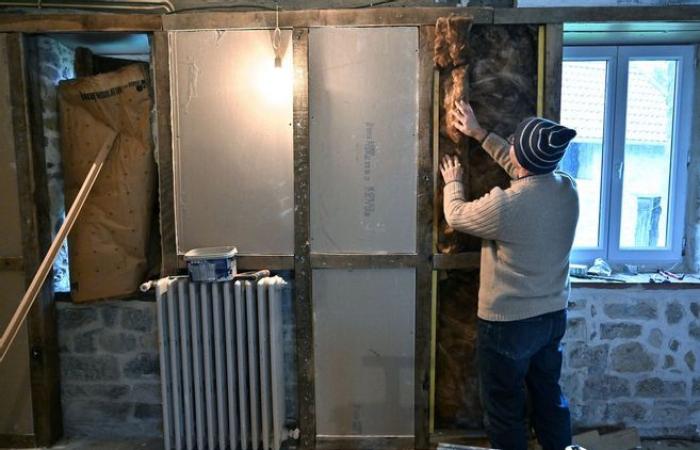Owners of thermal strainers can rest assured: they don't have a knife in their throat. The date of January 1, 2025 is not an ax to stop renting but a signal to begin the necessary work.
The counter is ticking for owners whose homes are classified G, the lowest grade on the energy performance scale. From January 1, 2025, without improvement, their property is even supposed to be indecent and unfit for rental. But at this stage, the law is essentially an incentive and no sanctions will be imposed.
What is it about?
The climate and resilience law requires landlords to upgrade their most energy-intensive properties or risk no longer being able to rent them. The calendar, spread over ten years, concerns what are commonly called “thermal sieves” on a scale going from A, the most efficient, to G, the “bad performers” in terms of greenhouse gas emissions. .
The ban already applies to G+, at the very bottom of the energy performance diagnosis (DPE) – i.e. more than 450 kWh per square meter per year in final energy. On January 1, 2025, it will target Gs, then Fs in 2028 and up to E from 2034.
What are the objectives?
What is this criterion of decency that must be met? “It relates to the comfort of the resident, their well-being, their good health, and limited energy bills,” explains Danyel Dubreuil, coordinator of the energy efficiency division for the Cler network. The object is therefore in no case unsanitary conditions, these extremely serious situations which can be accompanied by a ban on living and using the premises.
“The aim of the decency decree, which has existed since the 1980s, is to gradually improve and renovate housing. This trajectory is considered as a counterpart to the tax advantages and other material assistance granted to landlord properties via tax deduction schemes in particular,” recalls our specialist.
The State has therefore massively supported this “support role” of the private sector in producing social housing. But he had not initially measured the deterioration of the property, hence this law passed in 1989. “It made it possible to eliminate housing without toilets or showers inside or without a heating system,” welcomes Danyel Dubreuil . Today, energy strainers – estimated at nearly 30% in the private rental stock – therefore represent the new target.
Receive our eco newsletter by email and find the latest news from economic players in your region.
Warning or ax?
The deadline is fast approaching for G-rated housing. “Many tenants are in a situation of fuel poverty, much more than the national average. We had to send a strong signal to landlords,” says the coordinator of the Let’s Renovate Initiative!
But he immediately delays: “This decency decree can only be activated by tenants. This never happens because the duration is 7 years on average, which tenants lose half the time and, very often, have left the accommodation before the end of the procedure. Furthermore, this decree is not backed, today, by any set of sanctions if it is not respected. »
January 1, 2025, from the very mouth of Michel Barnier's advisor, is in no way an ax. This is a signal terminal. This sends a great message to landlords about what the future will be like.
Daniel Dubreuil (Coordinator of the energy efficiency center for the Cler network)
The intention is therefore more moral than restrictive. For the public authorities, it is a question of getting landlord owners to undertake work while being aware of “the consequences” of their possible inaction: “Most of the time, we rent an energy sieve to rather modest people whose we are making the situation even worse,” he summarizes.
Who to turn to?
The question is not: Can I rent my property or not on January 1st? But rather: Am I able to carry out work or not? The first step is to obtain information from the France Rénov' Consulting Centers – there are them all over the country which can advise and support individuals at each stage of their work project.
Being well informed is essential, if only on MaPrimeRénov', a billion euros of which has not been used in 2023, a sign that the changes to the main aid system have discouraged more than one. “All of this is demobilizing as people ask themselves the right questions,” confirms Danyel Dubreuil.
Aid exists to renovate your energy sieve, but requesting it is not easy: the example in Cantal
To put it simply, MaPrimRénov' is accessible to all owners, landlords or occupants, provided that the accommodation is a main residence. The amount of the premium is modulated according to the household's income and the nature of the work: either a single step, such as the installation of a heat pump, or more ambitious renovations, that is to say work allowing a gain in at least two energy classes, which are an investment in the future.
“Even if it is not coercive, at this stage, the measure is and will remain mandatory. We might as well not shy away from the obstacle because state aid is not intended to be eternal,” emphasizes Danyel Dubreuil.
Nathalie Van Praagh






